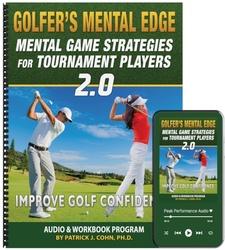
How to Reduce Unnecessary Thoughts
Is thinking bad on the golf course? This question receives a lot of attention and discussion among the golfing world.
Thinking is not only beneficial but necessary to plan your strategy for each hole and each shot.
Thinking becomes detrimental when you can’t shut down those conscious thoughts just prior to striking the ball. This is when golfers cross over to the side of overthinking.
Overthinking is when you put too much time into conscious thinking about how you are playing a shot, swing mechanics, second-guessing, projecting outcomes, mentally reviewing past shots, or over-analyzing what you need to change from other missed shots.
Overthinking becomes mental interference when your thoughts start to cause your body to freeze and now know what you want it to do (often the culprit with the yips).
Shutting down overthinking was the question one golfer posed in our golf survey:
“How do I relax my thoughts when I have a short three to four footer in competition play?”
Let’s examine the situation of overthinking when you face a relatively short putt…
Overthinking for you starts even before you line up the ball. You play out a worst-case scenario in your head over and over.
“I need to sink this putt to stay within striking distance on the back nine. I haven’t putted well today, so I need to turn it around soon. What if I hit the ball well past the cup and three-putt this hole. The greens are slick and breaking to the right but I’ve been leaving putts short. I have to make this.”
Even after you pick your line, you are not 100 percent sold on it being the right plan of attack. So you second-guess yourself and take a longer time standing over the ball creating even more time to think.
You notice your palms getting sweaty, tightness in your shoulders. You take those few extra waggles as you try to consciously regain control before the putt. You have now turned the relatively simple act of putting into a complex and complicated ordeal.
Even PGA Tour golfers can fall into the trap of overthinking and need effective strategies to counter overthinking and over-analyzing.
PGA golfer Adam Long, winner of the 2019 American Express tournament, recalled his thought process during the final hole, just before sinking his 13-foot birdie putt to win the tournament.
LONG: “I knew the more I thought about it the harder [the 7-iron approach shot from the right rough on the closing hole] was going to be. I got over it and thought, ‘I’ve got to be an athlete about it and somehow will this towards the hole.’ Hit a 7-iron, looked up, and couldn’t have been any better. It was going right at the flag and ended up like 13 feet and the rest is history.”
Long’s example is proof that you can manage overthinking and play your best golf even under the pressure of winning.
Relaxing Your Thoughts and Shutting Down Overthinking
The first step is to relax your mind and body. This can be accomplished by taking several deep breaths prior to your shot. Deep breathing slows down your heart rate diverting your mind from the physical response of anxiety and freeing your mind to focus on what is right in front of you.
The next step is to redirect your focus away from ‘what ifs’ or the many potential outcomes of your shot. A sound and consistent pre-shot routine will help focus on the shot at hand minimizing your fears of potential outcomes.
Next simplify your pre-shot routine. Once you make a decision, stick with it. And don’t have 3 swing thoughts as you stand over the shot or putt.
Remember that once you get over the ball, all the decision making is complete and it’s now time to become an athlete instead of a thinker. This means you have to move from decision-making to execution.
Focus on one image over the ball — such as tempo or target. Keeping it simple will improve consistency.
Related Golf Psychology Articles
- How to Overcome Overthinking on the Golf Course
- How to Stop Overthinking During Your Swing
- How to Maintain Positive Momentum When You Are Golfing
- Subscribe to The Golf Psychology Podcast on iTunes
- Subscribe to The Golf Psychology Podcast on Spotify
Golfer’s Mental Edge 2.0

Do you suffer from fragile self-confidence after missed hitting shots or making mistakes, playing with strict or high expectations that undermine confidence, or the inability to play freely and relaxed on the course?
Successful golfers have learned how to perform with ultimate confidence in competition, so we’ve developed The Golfer’s Mental Edge 2.0 Workbook and Audio program to help you do this!
The Golfer’s Mental Edge 2.0 program includes the top 11 mental training sessions I do with my personal students to help them boost their mental game and improve consistency on the course!